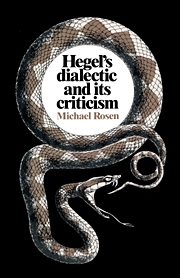Book contents
- Frontmatter
- Contents
- Preface
- A note on texts and translations
- Abbreviations of works referred to
- 1 The Interpretation of Philosophy
- 2 Determinate Negation and Immanent Critique
- 3 The Dialectical Movement
- 4 Imageless Truth
- 5 The Prose of Thought
- 6 From Being to Nothingness (and Back Again)
- 7 A Negative Dialectic?
- 8 Conclusion
- Bibliography
- Index
3 - The Dialectical Movement
Published online by Cambridge University Press: 26 January 2010
- Frontmatter
- Contents
- Preface
- A note on texts and translations
- Abbreviations of works referred to
- 1 The Interpretation of Philosophy
- 2 Determinate Negation and Immanent Critique
- 3 The Dialectical Movement
- 4 Imageless Truth
- 5 The Prose of Thought
- 6 From Being to Nothingness (and Back Again)
- 7 A Negative Dialectic?
- 8 Conclusion
- Bibliography
- Index
Summary
The safest general characterization of the European philosophical tradition is that it consists in a series of footnotes to Plato.
A.N. WhiteheadI argued in the previous chapter that the distinctive feature of determinate negation – that it should produce a positive result – received no independent justification sufficient to persuade the resolute sceptic in his own terms. The consequence is that, rather than taking determinate negation as a presuppositionless feature of rationality in general, it should be seen as a feature which only displays itself in pure form in the context of the ‘movement of the pure essentialities’, i. e. as part of the Logic.
Acquaintance and Description
The ability to understand the Scientific discourse is, I claimed, something like tacit knowledge. Its presupposition is the possession, by the person who understands, of a form of consciousness with which he is acquainted as a matter of lived experience. In giving an account of what this experience is like we are not thereby providing an initiation into it.
Yet it might be thought that Hegel's own text contradicts my suggested separation for the purposes of commentary between the Scientific discourse and an external (‘narrative’) characterization of it. We read, for example:
That with which one is acquainted [das Bekannte] is not, because a matter of acquaintance, thereby something known cognitively [erhannt].
(P. d. G., p. 28)The contrast between the ‘Bekannte’ and the ‘Erkannte’, as Hegel understands it, is the contrast between natural thought, which has attained Science in the form of Vorstellung, and true Science.
- Type
- Chapter
- Information
- Hegel's Dialectic and its Criticism , pp. 55 - 91Publisher: Cambridge University PressPrint publication year: 1982

